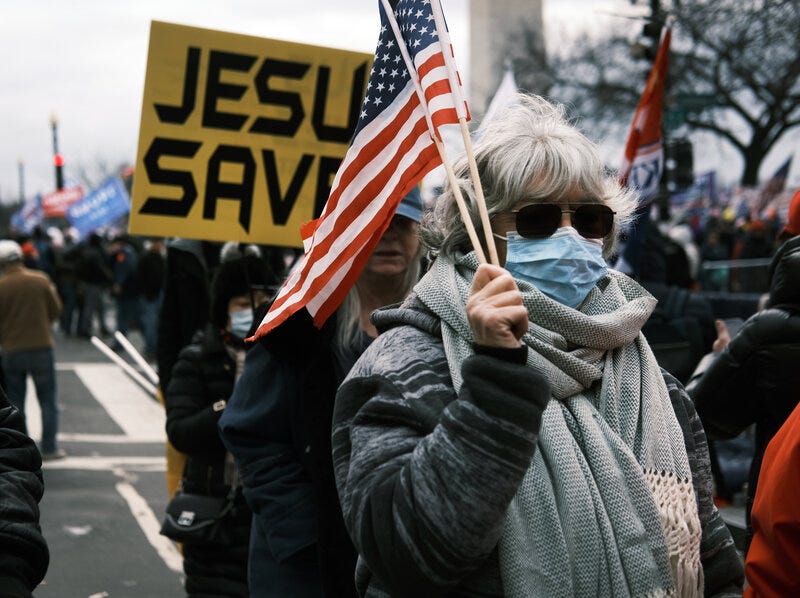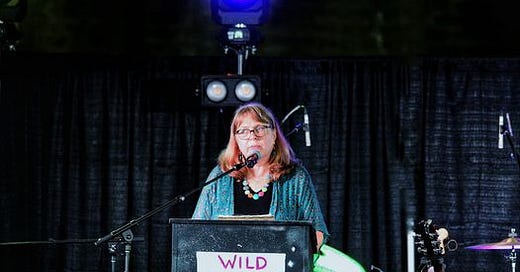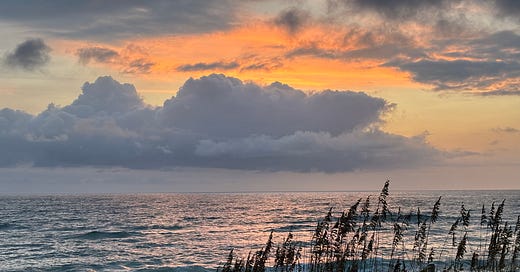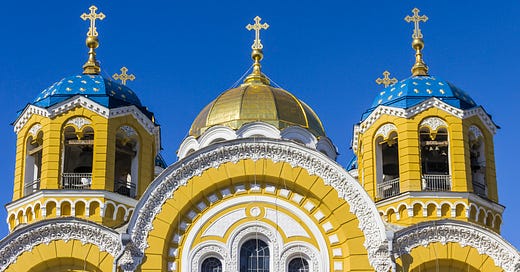

Discover more from The Cottage
It may be Advent (and the Advent calendar continues daily!), but there’s still news — and sadly, a lot of that news isn’t very good. In recent days, several stories have appeared about Christian nationalism, the power of authoritarianism, the threat of democratic collapse, and the role of some religious groups in the January 6 insurrection. I’m deeply concerned about all of this. More than concerned. Worried. Really worried.
That worry isn’t recent - as a friend reminded me today. He tagged me in a Facebook post that I wrote FIVE years ago, on December 6, 2016.
I’ve reposted the unchanged and unedited original below. As you can see, five years ago I was ruminating about the “religious dimensions” of the “current crisis” and my fear that a new religious ethnonationalism was being born in front of our eyes.
I was speculating then.
Now, five years later, we have some Christians arguing against democracy and proposing that ethnonationalism is a godly, “positive” political option for America. What once concerned me is now coalescing into a religious-political movement.
Tell me what you think about what I wrote then - and where you think this all might be going. What’s the role of the church at this moment? What should people of faith, clergy, and religious groups do to respond to what is no longer mere speculation?
What do WE do now?
* * * * *
FROM FACEBOOK, December 6, 2016
The religious dimensions of the current crisis -- what I'm thinking about right now.
1) Evangelical Christianity has sold out its soul to right-wing politics utterly and completely -- leading to both a dizzying embrace of power and a rapidly escalating loss of its next generations.
2) The old -- and largely white -- mainline Protestant denominations are hopelessly locked in a kind of moderation that makes it impossible to be either pastoral or prophetic, thus alienating both those who want to cooperate with Trumpism and those who see it as absolutely opposed to the Gospel. The "civic" faith of the mainline is caught in a death grip of the end of anything recognizably "civic" in American public life. New "civic" faiths will emerge from formerly marginal communities -- mostly black and Latino churches -- and from the non-religious/post-religious impulses of the culture.
3) Globally, western forms of Christianity now must decide if religion harbors/supports ethnonationalism and new forms of authoritarianism, or if the prophetic/liberationist streams of faith must compel a new reformation.
4) Related to (3): Are we witnessing the emergence of a nationalist/political form of Christian fundamentalism that sees its scope not as "a Christian America," but as a reinstated 21st century neo-Christendom, i.e., a global-religious-economic-Euro-racial empire? I think it highly probable.
5) Related to (3) and (4): Would such a neo-Christendom declare war on other world religions? Phyllis Tickle used to think that this was inevitable.
6) The old boundaries between religions are shifting -- away from beliefs and practices toward orientation around the meaning of history and cosmopolitanism. Thus, Christians, Jews, Muslims, etc who have "open" views of history and the global commons share more with each other than their "fellow" Christians, Jews, Muslims, etc who have "boundaried" views of history and global commons. So, functionally, we are moving toward a massive realignment that completely changes what we understand to be religion.
7) Even though people in western nations are less Christian than in past generations, a neo-Christendom appeals to memory and deep ancestral pride, whereas the emerging cultural patterns around cosmopolitanism (not colonialism) and finding meaning within a history of neighbor and nature seems vague and unachievable. Without a clear vision of the future, anxious people fall back on nostalgia, whether or not they even "believe" anything of the religious or faith content of Christianity.
Just a few thoughts on a Sunday night.
Christian nationalism—the belief that America is God’s chosen nation and must be defended as such—serves as a powerful predictor of intolerance toward immigrants, racial minorities, and non-Christians.
― Kristin Kobes DuMez
Christian nationalism seeks to merge Christian and American identities, distorting both the Christian faith and America’s constitutional democracy. Christian nationalism demands Christianity be privileged by the State and implies that to be a good American, one must be Christian. It often overlaps with and provides cover for white supremacy and racial subjugation. We reject this damaging political ideology and invite our Christian brothers and sisters to join us in opposing this threat to our faith and to our nation.
— Christians Against Christian Nationalism
Advent 1971
— Madeleine L’Engle
When will he come
and how will he come
and will there be warnings
and will there be thunders
and rumbles of armies
coming before him
and banners and trumpets
When will he come
and how will he come
and will we be ready
O woe to you people
you sleep through the thunder
you heed not the warnings
the fires and the drownings
the earthquakes and stormings
and ignorant armies
and dark closing on you
the song birds are falling
the sea birds are dying
no fish now are leaping
the children are choking
in air not for breathing
the aged are gasping
with no one to tend them
a bright star has blazed forth
and no one has seen it
and no one has wakened











As always, thank you for your work and courageous words here. If ever there was a time when the biblical vision of God's sovereignty and ongoing care of creation is vitally important, now is that time. Unfortunately, you mention only one terrifying crisis. There's always that backdrop of the climate crisis, which is probably impossible to always keep in mind when there are so many other disheartening political developments. Given the size and potential of our situation, I'm thinking that only congregations and revitalized pulpits have the potential for speaking to our current crisis. The old expression "biblical proportions" is now literally an accurate way to describe the problems that confront us. Thank God for that biblical word with which to respond. Your ministry through the years has been greatly helpful in preparing churches for this moment.
I find myself wondering if the “church of the future” won’t look more like the first century church - local house churches linked in common faith by traveling teachers, preachers and apostles, and letters to the faithful.